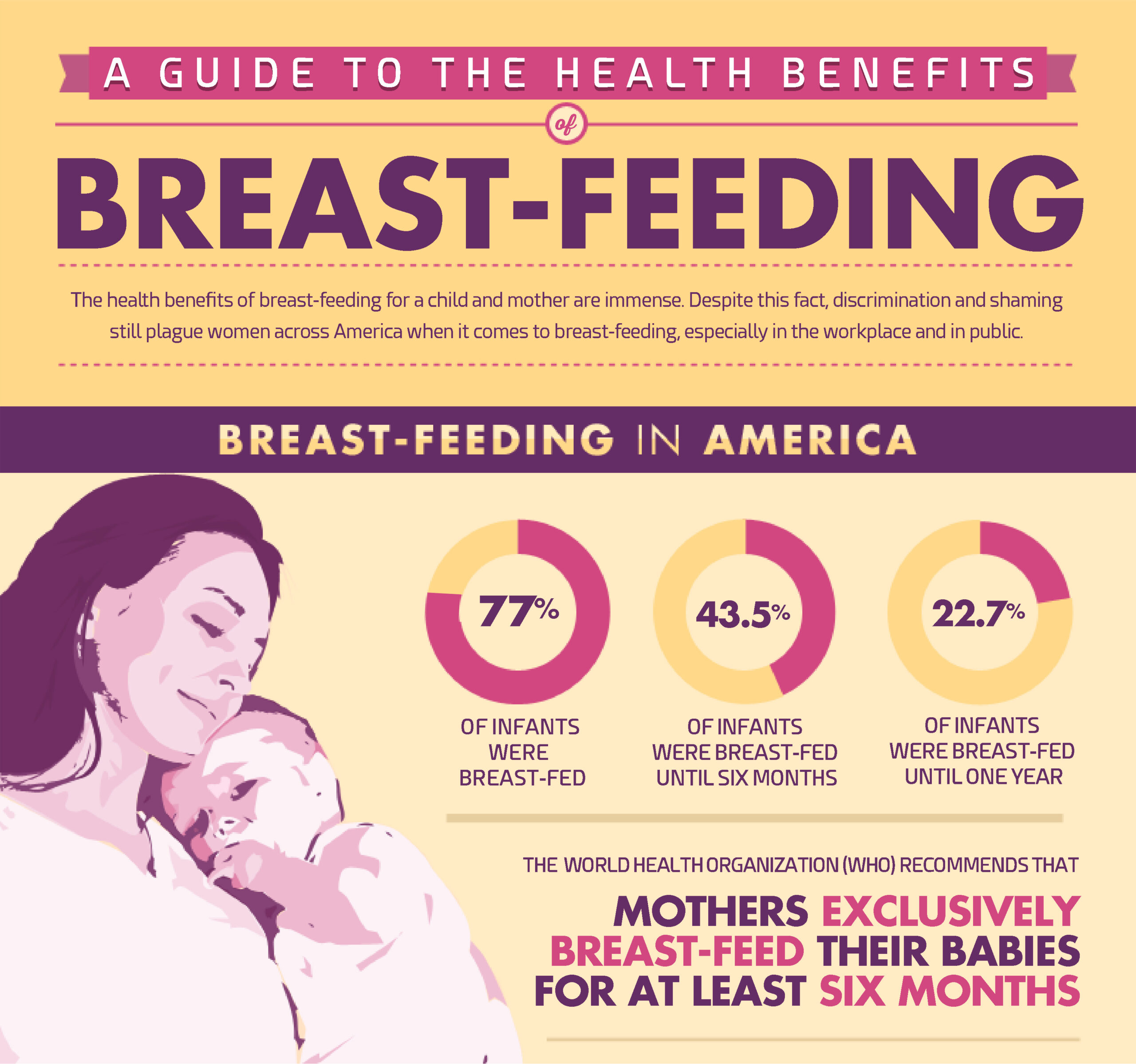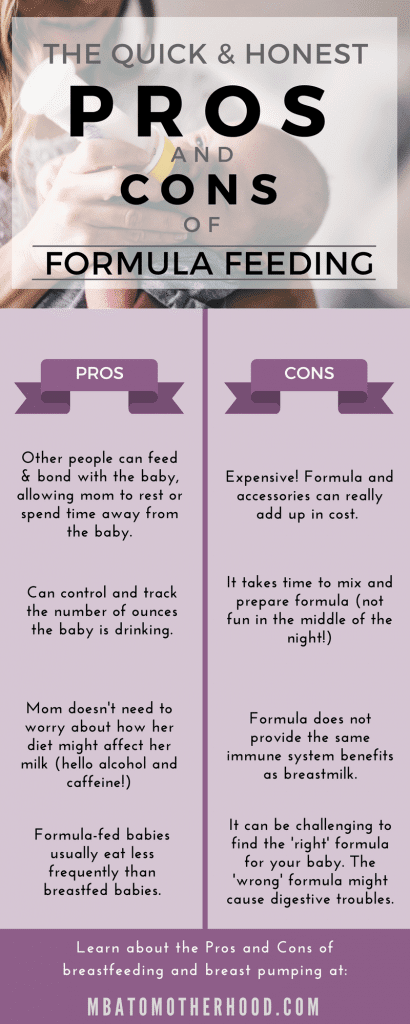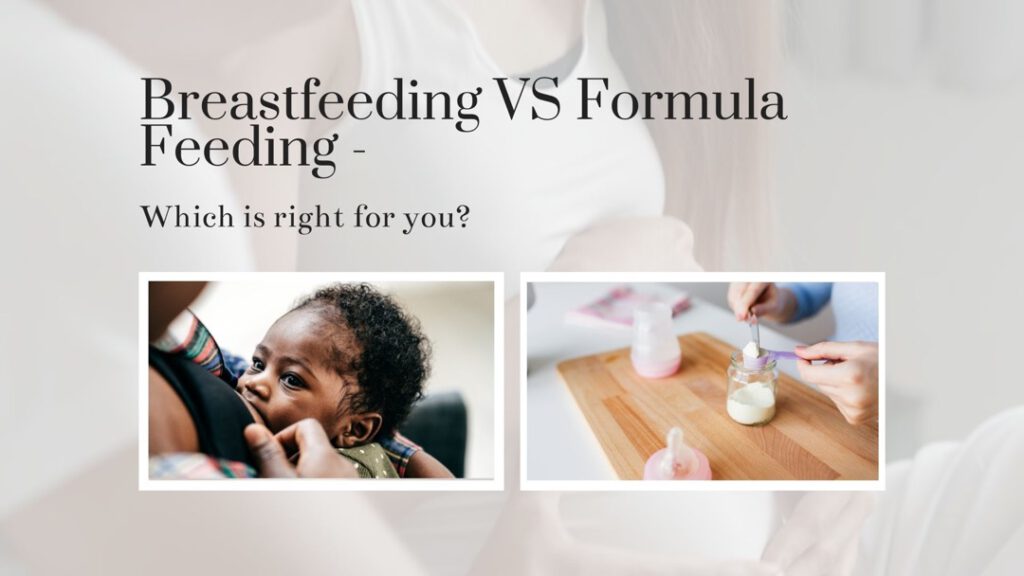If you’ve watched the news lately, you’ve seen that baby formula is in scarce supply. Hospitals are rationing it, and stores are running out. So what’s a new mom to do?
The answer is simple: it depends on what’s best for you and your baby. There are benefits to both breastfeeding and formula feeding, and ultimately the decision is up to you.
This article will discuss the pros and cons of breastfeeding and formula feeding to help you make the best decision for you and your baby.
Ready? Let’s dive in.
Pros of Breastfeeding

Image Source: Bradley University
Breastfeeding has many benefits, both for the baby and the mom. Here are seven of the most notable benefits:
Breastfeeding is a natural way to provide your baby with the nutrients they need.
According to the World Health Organization, breastmilk is the ideal food for infants. It contains all the nutrients your baby needs in the first six months of life and can provide up to half of their nutritional needs in the second six months.
So if you want your baby to get the best possible nutrition, breastfeeding is the way to go.
Breastfeeding can help protect your baby from illnesses and diseases.
Breastfeeding has been shown to protect babies against various health problems and illnesses. According to the Centers for Disease Control, breastfed babies have a decreased risk of asthma, obesity, type 1 diabetes, and SIDS (sudden infant death syndrome). Breastfed infants are also less likely to get ear infections or stomach viruses.
So if you’re looking for a way to help keep your baby healthy, breastfeeding is a great option.
Breastfeeding can help your baby develop strong bones and teeth.
A 1992 study by the New York State Department of Health found that breastfeeding can help babies develop strong bones and teeth. The study found that breastfed infants had significantly higher bone calcium levels than formula-fed babies.
So if you’re looking for a way to help your baby develop strong bones and teeth, breastfeeding is a great option.
Breastfeeding can help your baby maintain a healthy weight.
A 2008 Centers for Disease Control study found that breastfeeding can help babies maintain a healthy weight. The study found that breastfed infants were less likely to be overweight or obese than formula-fed infants.
If you want to help your baby maintain a healthy weight, breastfeeding is the way to go.
Breastfeeding is convenient – you can do it anywhere, anytime.
No study is needed to support this benefit – any breastfeeding mom can tell you it’s convenient! You can breastfeed anywhere, anytime, without worrying about packing bottles and formula.
Mommies already carry along enough stuff – the last thing you want to do is add more to your bag.
Breastfeeding is affordable – there are no bottles or formulas to buy.
In the United States, the cost of baby formula has risen dramatically – and that’s if you can find any. According to Smartasset.com, you can expect to pay between 54 cents per ounce to $1.15 per ounce or higher if you’re using a specialty formula. Bottle feeding costs can add up quickly!
If you’re looking for a more affordable way to feed your baby, breastfeeding is the way to go.
Breastfeeding can help you bond with your baby.
Breastfeeding is a great way to bond with your baby. According to WebMD, “Breastfeeding creates a bonding experience between mother and child because it promotes skin-to-skin contact, more holding and stroking.”
So if you’re looking for a way to bond with your baby, breastfeeding is the way to go.
Cons of Breastfeeding
Of course, there are also some drawbacks to breastfeeding. Here are a few of the most notable ones:

Breastfeeding can be painful
For some women, breastfeeding can be pretty painful. According to the La Leche League, “Certain positions might put too much pressure on your nipples, making them sore. You might also have cracked nipples, which can be painful and make breastfeeding more difficult.”
If you’re experiencing pain while breastfeeding, talk to your doctor or a lactation consultant. They can help you find a comfortable position for you and your baby.
Breastfeeding can be exhausting.
For some women, breastfeeding can be extremely tiring. According to First Cry Parenting, “In order to make milk, your body uses 25 percent of its energy.”
If you’re finding that breastfeeding is taking a toll on your energy levels, talk to your doctor. They might suggest pumping so that your partner can help with feedings.
Breastfeeding can be messy.
Let’s face it – breastfeeding can be messy. There’s no way to avoid it.
If you’re worried about the mess, invest in some good nursing pads and clothing that covers up your breasts.
That way, you won’t have to worry about leaking or stains.
If you’re not a fan of messes, breastfeeding might not be for you.
Breastfeeding can be time-consuming.
Breastfeeding can take a lot of time – sometimes up to an hour per feeding. If you’re finding that you don’t have enough time to get things done, talk to your doctor or a lactation consultant.
They might suggest pumping so that you can have bottles of breast milk on hand. That way, someone else can feed the baby while you take a break.
Breastfeeding can be challenging to master.
It’s just a fact – breastfeeding can be challenging to master. It takes time and practice to get the hang of it.
Talk to your doctor or a lactation consultant if you’re struggling with breastfeeding. They can help you troubleshoot any problems you’re having.

Image Source: mbatomotherhood.com
Pros of Formula Feeding
Now that we’ve looked at the pros and cons of breastfeeding, let’s look at the pros and cons of formula feeding.
Formula is easy to use – you can do it anywhere, anytime.
When formula feeding your baby, you’re not tied down to a place to sit or a specific time of day. You can feed your baby anywhere, anytime. These days, there are so many gadgets and containers to put the formula in that make it easy to take with you on the go.
Infant Formula is less messy than breastfeeding – there’s no leakage or stains.
Ok, this pro depends on a few factors. If you’re using a bottle and nipple, there can be leakage. But overall, formula feeding is much less messy than breastfeeding. There’s no need to worry about leaks or stains.
So, if you don’t like messes, formula feeding might be the way to go.
Formula can give your baby all the nutrients they need.
When you formula feed your baby, you can ensure they get all the nutrients they need. According to Kidshealth.com, Formula-fed babies get, “all the nutrients they need to grow and develop. You don’t have to worry about whether or not your baby is getting enough to eat.”
Although it’s doubtful that formula can provide as many nutrients as baby breast milk can, you can still rest assured knowing that your baby is getting everything they need.
Formula can give you peace of mind.
Here’s another pro that doesn’t require a statistic. When you formula feed your baby, you can have peace of mind knowing that they’re getting everything they need.
You don’t have to worry about whether or not you’re producing enough milk or your baby is getting enough to eat.
Formula can give you more freedom.
When you formula feed your baby, you have a lot more freedom. You’re not tied down to feedings every few hours. You can go out and about without having to worry about pumping or finding a place to breastfeed.
You can return to work knowing that your baby will never be hungry.
Formula feeding can allow you to live your life how you want to – without worrying about your baby’s next meal.

Cons of Formula Feeding
Now that we’ve looked at the pros of formula feeding, let’s consider the cons.
Formula is expensive – it can cost up to $2000 per year.
Formula isn’t cheap. Formula feeding your baby can cost upwards of $2000 per year. If you’re on a budget, formula feeding might not be the best option.
Formula is hard to digest – it can cause gas and tummy aches.
Formula is made from cow’s milk or soy, which are hard for babies to digest. This can cause gas and tummy aches for your little one.
According to Healthline.com, “It’s always possible that the ingredients in baby’s formula don’t agree with their GI tract.” The proteins in cow’s milk or soy are likely the culprits behind the tummy aches.
Formula can cause allergies – it’s one of the most common allergies in infants.
Allergies to cow’s milk and soy are some of the most common allergies in infants. According to kidswithfoodallergies.org:
- “Cow’s milk allergy is one of the most common types of infant food allergy.”
- “Soy formulas are no less allergenic than cow’s milk-based formulas. Eight to 14% of infants with cow’s milk allergy will react to soy.”
So you can see, if your baby is allergic to cow’s milk or soy, formula might not be the best option.
You can’t bond with your baby while formula feeding.
When you breastfeed, you have the opportunity to bond with your baby. You’re physically close to them and looking into their eyes. This physical closeness can help you bond with your baby in a way bottle-feeding can’t.
Now, we’re not saying it’s impossible to bond with your baby while formula feeding – just that it’s more complicated.
Formula can’t help mommy avoid postpartum depression.
Breastfeeding has been shown to help mommy avoid postpartum depression. According to a recent study published in the Cambridge University Press, “exclusive breastfeeding may help to reduce symptoms of depression from childbirth to 3 months postpartum.”
So, breastfeeding might be a better option if you’re worried about postpartum depression.

Choosing what’s best for you and your baby
As you can see, there are pros and cons to both breastfeeding and formula feeding. It’s ultimately up to you to decide what’s best for you and your baby.
No matter your choice, you should decide before your baby arrives so you can be prepared. It’s a good idea to talk to your health care provider or a lactation consultant if you have any questions. They will be able to help you make the best decision for you and your baby.
Speaking of before your baby arrives…
Do you want to see your baby before they’re born? We can help you with that!
Here at Look at Me 4D Imaging, we offer 3D/4D ultrasound services so you can see your baby in detail before they’re born. We have a variety of packages to choose from, so you can find one that’s perfect for you.
We also offer gender determination starting at seven weeks, so you can determine if you’re having a boy or a girl. Our Sneek Peek Clinical is a quick and painless way to find out the gender of your baby.
If you’re interested in seeing your baby before their birth, give us a call today! We’d be happy to answer any questions you have.




